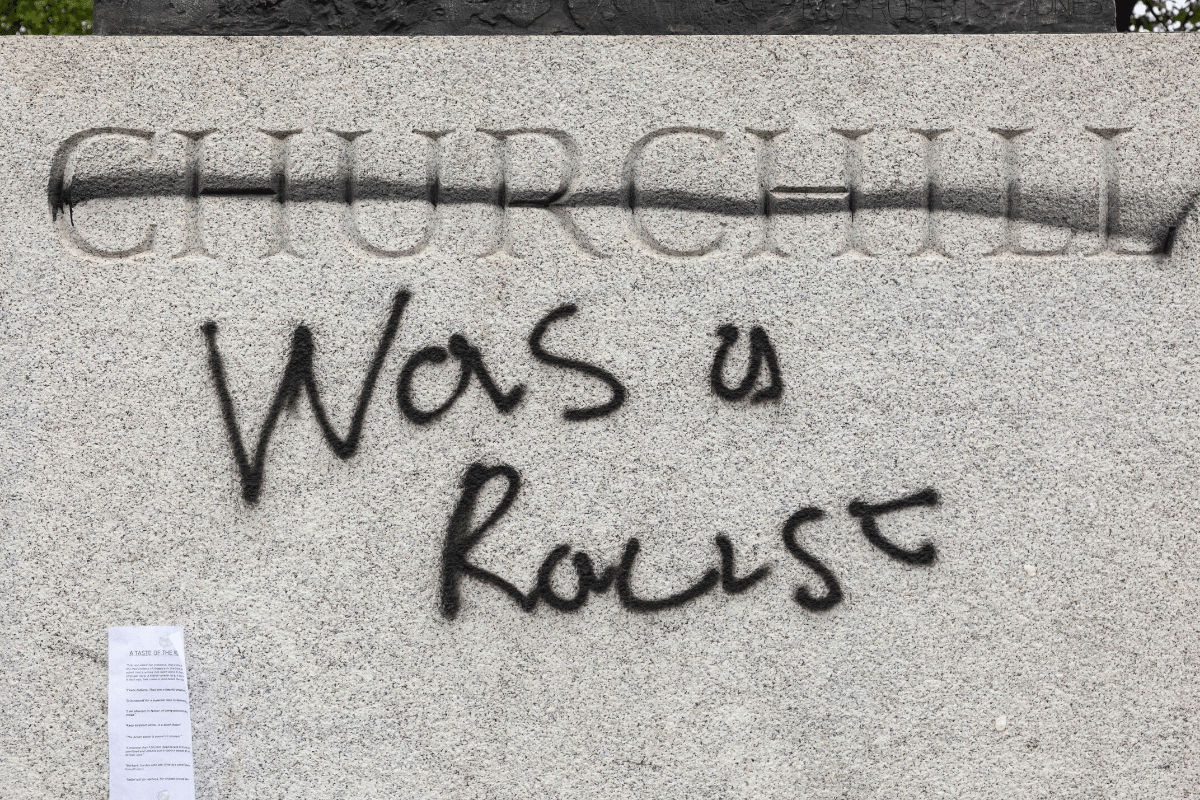Bruce Gilley
Bruce Gilley vs Cancel Culture
In 2019, Gilley found himself rebuffed by his own university when he proposed a course on “Conservative Political Thought.”

Professor Bruce Gilley of Portland State University is a man not unfamiliar with controversy.
In 2017, he wrote an article titled “The Case for Colonialism,” which argued that Western colonialism was “both objectively beneficial and subjectively legitimate in most of the places where it was found.” Soon after the article appeared on the website for Third World Quarterly, the journal where it had been accepted for publication, two petitions were launched demanding its retraction. One of these, which got more than 7,000 signatures, claimed that sentiments expressed in the article “reek of colonial disdain for Indigenous peoples and ignore ongoing colonialism in white settler nations.” (The other petition, incidentally, got more than 11,000 signatures.) By the time the dust settled, Third World Quarterly’s editor had received “serious and credible threats of personal violence,” 15 members of the editorial board had resigned, and Gilley’s article had been retracted.
For Gilley, however, things were just getting started. A group of current and former students from Portland State University wrote to his bosses to express their “collective outrage, sadness and frustration.” In the letter, they claimed that “scholarly critiques are inadequate to articulate the personal effects this article is having on his students,” and accused the professor of “marginalising individual students based on their race and gender.” As a result, the university’s “Office of Equity & Compliance” began a five-and-a-half month investigation, which Gilley subsequently described as “insidiously intimidating.” Fortunately for him, the investigation found that he had not violated the university’s harassment policy, although it did conclude that he would “benefit from implicit bias and microaggressions training.”

In 2018, Gilley was invited to give a talk on “The Case for Colonialism” at Texas Tech University. This prompted 23 faculty members to sign a letter calling for the invitation to be withdrawn. The signatories noticed that Gilley’s talk was “clearly based” on his essay of the same title. It was therefore objectionable, they maintained, because Gilley’s essay “has been discredited as historically inaccurate by the academic community.” Among their other objections were that the lecture “does not in any way serve Texas Tech’s efforts to promote diversity,” and that the university “should not be perceived as a promoter of discredited segregationist scholarship.” They also claimed the timing was unsuitable, given that efforts were then underway “to make our campus a diverse space where free speech is valued but inflammatory ideas are not welcome.” In the end, Gilley’s talk was allowed to go ahead, but only after the university’s president had issued a statement expressing “our strong disagreement” with his ideas.
In 2019, Gilley found himself rebuffed by his own university when he proposed a course on “Conservative Political Thought.” He had already taught the course twice, but needed to obtain something called “permanent status” in order to teach it a third time. Every course at Portland State must be seen to advance “diversity,” but in the corresponding section of the application, Gilley wrote that his course would challenge “group-based identity and victimization/entitlement approaches to political community.” (He had apparently been advised to “keep his head down, explain how the class advances diversity… and then teach as he saw fit.” However, this was unacceptable to Gilley, who stated, “I’m at a stage in my career… where I don’t want to play these games anymore.”) Portland State ultimately rejected Gilley’s course proposal on the grounds that “the diversity perspectives and engagement sections did not support the university commitment to access and inclusion.”
Earlier this year, it transpired that Gilley’s department chair had convened a secret committee to address his “extramural activities.” (By “secret,” I mean that Gilley was not made aware of the committee; he obtained the relevant documents via a freedom of information request.) The committee made several recommendations, three of which were subsequently adopted by the department. Resolution (1) states that faculty members “should make a good faith effort” to state that their views are not those of the department. Resolution (2) states that faculty members should inform the department chair when their activities “are likely to generate negative reactions.” And resolution (3) states that faculty members should follow a given procedure when they believe the department should make “an official statement in response to another faculty member’s work.” In other words, faculty members must do such-and-such when they want the department to publicly denounce something Bruce Gilley has said.
Which brings me to the embattled professor’s latest controversy. Gilley has spent five years researching the life of Sir Alan Cuthbert Maxwell Burns, a British colonial administrator who served as Governor of the Gold Coast (now Ghana) from 1941 to 1947. His research culminated in a book titled The Last Imperialist: Sir Alan Burns’ Epic Defense of the British Empire, which was due to be published by Lexington Books (an imprint of Rowman & Littlefield). The book was to be the first in a new series on ‘Problems of Anti-Colonialism.’ However, on September 26th—just two weeks before the book was meant to ship—a petition was launched calling for its termination.
The petition, which has collected more than 1,000 signatures, begins by noting that Gilley’s infamous 2017 article was retracted because “it had been published without peer review.” However, according to the retraction notice on Third World Quarterly’s website, an investigation “clearly demonstrated the essay had undergone double-blind peer review.” The petition goes on to argue that Gilley “has shown a pig-headed refusal” to deal with “rigorous historical analyses,” and that his series will “lend academic credibility to paternalist and eurocentric revisionism and neo-colonial and settler-colonial propaganda and policy.” (As Nicholas Clairmont notes in a recent essay for Tablet Magazine, speaking “wokese” requires that you always put “settler” before you write “colonialism.”)
The petition, incidentally, was organised by an individual whose blog is titled “M-L-M Mayhem!” (the “M-L-M” referring to “Marxism, Leninism, Maoism”). In the blog’s “About” section, the author describes himself as an academic “who works on historical materialist engagements with colonialism, subjectivity, aesthetics, and the contradictions of radical struggle.” There also happens to be a section for the “PCR-RCP,” i.e., the Revolutionary Communist Party of Canada, which the author describes as an “organization I support and promote.”
Unfortunately for Gilley, the petition achieved its intended aim. On September 29th, he received notice from the publisher that his book, and the series of which it was part, had been cancelled. The following day, an update was added to the petition, in which the organiser thanked his fellow signatories, and declared that “Gilley’s shameful series has been rejected.”
Gilley then went on the offensive. On October 3rd, he shared a letter to Lexington Books from Professor Andrew Nathan of Columbia University, which argued that “it does great damage to the cause of academic freedom” when a publisher yields to outside pressure. On October 5th, he shared a letter from Professor Tirthankar Roy of the London School of Economics, which described Gilley’s book as a “finely written evidence-based biographical study,” and argued that the publisher had capitulated “to a crowd that has internet power but no apparent credential to judge scholarship.” A few days later, he shared a letter from Professor Rhoda Howard-Hassmann of Wilfrid Laurier University, which again criticised the publisher for undermining freedom of speech.

On October 7th, Gilley wrote an op-ed for the Wall Street Journal relating events up until that point. A counter-petition was launched the same day. It calls for Rowman & Littlefield to apologize for cancelling The Last Imperialist and to “publish its own vindication of Dr. Gilley as an honest and reputable scholar.” More than 4,000 people have signed the counter-petition, although—so far as I’m aware—its demands have gone unheeded. Then on October 9th, Gilley wrote a piece for the American Conservative, which reveals some details about the publisher’s decision-making (or rather, its supposed decision-making).
On October 8th, Andrew Nathan—who you will recall had written to the publisher on October 3rd expressing his “dismay” over the cancellation of Gilley’s book—received an email from Jed Lyons, the head of Rowman & Littlefield. According to this email, Gilley’s book was cancelled after “we were made aware of problems regarding his previous work.” Lyons provided a link to an essay titled “The Case Against ‘The Case for Colonialism'” by Sahar Khan of the Cato Institute, and noted that “Cato is hardly a left wing think tank.” He added, “We trust their judgement as well as that of other detractors of Bruce Gilley’s academic work.” However, this excuse doesn’t make a great deal of sense. The Last Imperialist is a completely different work, and it had already passed peer review. As Gilley notes, “If the publisher had these concerns, why did it not let me know, and why am I finding out via a letter to a friend?”
In an apparent attempt to safeguard his company’s reputation, Lyons wrote a letter to the Wall Street Journal on October 15th claiming they had cancelled Gilley’s book “at his request.” What supposedly happened is that, after the petition began circulating online, they put the book on hold and removed it from their website while they “reviewed the matter.” The next day, before they had reached a decision about how to proceed, “Prof. Gilley asked that we release him from the contract to publish his book.” So you see, there was really no capitulation at all…
The Wall Street Journal gave Gilley an opportunity to respond. He recounts that, after Lexington Books removed his book from their website, he “spent two fruitless days emailing my editor seeking an explanation, only to receive silence.” In order to prevent his book from being deleted by the publisher, which the terms of the contact apparently allowed, he then requested the rights back, “which they did immediately and without explanation.” Gilley concludes, “That Mr. Lyons should seek to exculpate his act of censorship with reference to this technicality only adds to the disgrace of him and his organization.”
In his Wall Street Journal article of October 7th, Gilley said he had “no doubt” that both The Last Imperialist and the series of which it is part “will find new and better homes.” According to a recent update on the petition defending Gilley, that prediction has proven correct. Approximately one month after Lexington Books “disappeared” The Last Imperialist from its website, Gilley has found a new publisher for his book series. (And it seems that he had more than one offer.)
This is certainly good news from the standpoint of free inquiry and open debate, since it will allow people to read Gilley’s work for themselves, and then decide whether or not they agree with him. (As the House Minority Leader might say: we have to publish the book so that you can find out what is in it, away from the fog of the controversy.) Encouraging too is the speed with which other publishers came forward to offer their services. However, the fact that a book was cancelled at the behest of a petition does not speak well of the current state of publishing, especially since Gilley’s is not the only book to have been cancelled in the last 12 months. And of course, the fact that so many academics signed that petition in the first place does not paint a flattering picture of academia.
Even though Gilley has found a new publisher, this latest entry on his rap-sheet will undoubtedly have a chilling effect on free speech. (Few people wish to be embroiled in such a controversy, regardless of the outcome.) Opposing the cancellation of books, and the petitions that give rise to them, is therefore fundamental. And that’s true whether you agree or disagree with the author’s views.






